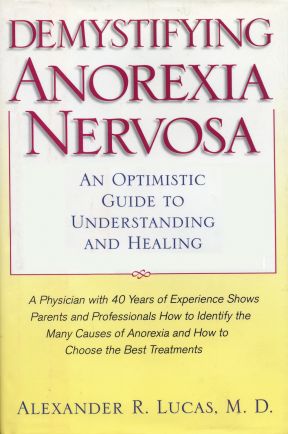Alexander R. Lucas, M.D., author of Demystifying Anorexia Nervosa is Emeritus Professor of Psychiatry and former Head of the Section of Child and Adolescent Psychiatry at the Mayo Clinic. For forty years he has been a recognized authority on anorexia, with a practice that drew patients from around the world. Demystifying Anorexia Nervosa defines anorexia, illustrates how it can evolve and how common it really is, and outlines every part of the treatment process, from the early warning signs that parents should watch out for, to the initial evaluation, to specific treatment plans. In the post below Dr. Lucas questions a French bill which would regulate the promotion of extreme thinness.
The French parliament’s lower house recently adopted a bill that would make it illegal for anyone to promote extreme thinness. The bill is aimed at magazines, advertisers, and particularly Web sites. Pro-anorexia Web sites (also known as pro-ana) glorify anorexia as a lifestyle choice rather than an illness. They are popular sites that advise teenagers and young women how to maintain extreme thinness. They are frequented by anorexics who share their experiences and advise one another about unhealthy practices.
This latest move by the French parliament comes after a Spanish fashion show banned models with a body mass index of less than 18, indicating waif-like abnormal thinness. This was a reaction to the 2006 death of the top Brazilian model Ana Caroline Reston. She weighed only 88 lb. at 5’ 8” and had suffered from anorexia and bulimia. In the U.S. the Council of Fashion Designers of America adopted guidelines for its models to be healthy, not anorexic or bulimic.
 The French bill, if passed by the senate, would be the strongest of its kind, and would impose high financial penalties, even imprisonment, if an infraction caused the death of a victim. This raises several questions. Can the avoidance of extreme thinness be legislated? Are voluntary guidelines preferable? And, more crucially, to what extent do cultural influences as conveyed by the media cause anorexia nervosa?
The French bill, if passed by the senate, would be the strongest of its kind, and would impose high financial penalties, even imprisonment, if an infraction caused the death of a victim. This raises several questions. Can the avoidance of extreme thinness be legislated? Are voluntary guidelines preferable? And, more crucially, to what extent do cultural influences as conveyed by the media cause anorexia nervosa?
There are many factors that lead to anorexia nervosa. First of all there is a biological predisposition with a genetic basis. Further, the individual developing anorexia nervosa has certain personality characteristics including willful determination and persistence. Individual psychological influences also play a role. Finally, there are the cultural influences, glamorizing extreme thinness. Thus, there is usually no single cause, but a combination of influences that lead to anorexia nervosa. Of these, the cultural influences would seem most easily to be altered, but would require a wholesale change in our society’s attitude, in advertising, and in the messages conveyed by the media.
It is naïve to think that a law will prevent anorexia nervosa. Any efforts, however, to establish healthy guidelines for models could protect them from excessive dieting. Healthier role models would also send the message to teenage girls that extreme thinness is not fashionable.






